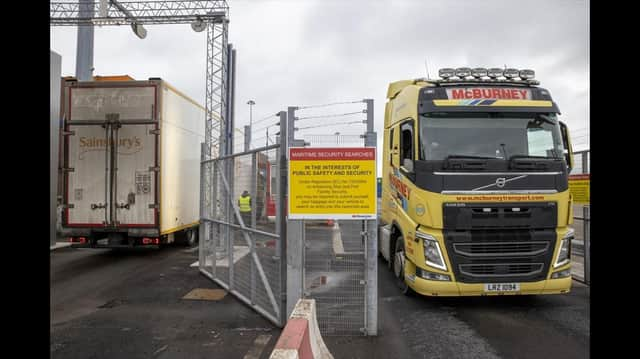Haulier: Far from getting rid of the Irish Sea border, the Windsor Framework reinforces it


(Scroll down for editorial: ‘So much for the feared Brexiteer and unionist, Chris Heaton-Harris’)
I wish to relate my experiences as we enter month 28 of what we all refer to now as Brexit and I will do simply, because I am a logistics expert and not a politician.
Advertisement
Hide AdAdvertisement
Hide AdThe UK and EU's attempt to implement the Northern Ireland Protocol has caused great turmoil to the Great Britain to NI supply chain. Both sides have attempted to absolve themselves from the damage caused by claiming that the problems were unforseeable when the protocol was signed in 2019, but all the issues were called out well in advance by those of us who work in the haulage sector.


I was personally told by a secretary of state for Northern Ireland in early January 2021, days after the barrier was introduced, that these were teething problems. Thankfully now everyone has come around to the fact that it just never worked for anyone.
Despite this experience it appears that few of the protocol lessons have been learned and now we listen in recent days to more spin about “sweeping change that removes any sense of an Irish Sea border,” to match the 2021 denial that the Irish Sea Border even existed. Logistics people did not create the Irish Sea Border, however with only days to go (in December 2020) untried, untested and unworkable processes including major and complex customs paperwork were imposed upon us.
We move goods all around these Islands and Europe. One of the central economic principles of any single market is frictionless trade, with no customs or regulatory borders, between constituent members. The East-West market (what we call GB to NI to GB) is by far the most significant trade movement for Northern Ireland. It is part of the UK internal market. This means that almost all movements happened without such paperwork. It is the most cost effective way to get goods to Northern Ireland. The internal market also supports unfettered access for goods going in the other direction, leaving Northern Ireland for GB, their best market place. In the four decades that I have worked in logistics, the Northern Ireland supply chain has been an exceptionally smooth running machine.
Advertisement
Hide AdAdvertisement
Hide AdThe protocol imposed a customs border in the middle of the UK internal market and requires international trade rules to be applied to regional domestic movements. We already know that this is unworkable.
The ‘Windsor Framework’ simply does not remove the Irish Sea trade border, it reinforces it. Now all EU customs formalities and health certification will have to completed before entering NI, whereas some of it was done after entry under the protocol (supplementary declaration).This will all help to cause an irreversible fracture to trade between GB and NI as the supply chain is forced to realign.
Goods which are not destined to go directly to an end consumer in Northern Ireland, such as wholesale supplies of timber or roof tiles for a building merchant, will be ‘red laned’ at Northern Irish ports and treated as if they are destined for the European Union, with full EU duties and tariffs having to be fulfilled before they enter the province. These goods may end up staying in NI, go back to GB or indeed go on to another country, but because of the positioning of the sea border are treated as goods entering NI from a third (foreign) country.
To get around the hard border the UK government has also created a ‘green lane’ to provide a way for retail goods which are moving directly from GB to a declared Northern Irish point of consumption (eg the canteen where it is being consumed, the restaurant where it is going to be used or the shop where it is going to be sold). This excludes a vast amount of goods.
Advertisement
Hide AdAdvertisement
Hide AdThe government has heralded the Windsor Framework as sorting out all the problems, whilst keeping the technical detail hidden from hauliers. However, the EU has provided more detail in their information packs, which gives traders a better view of the harm caused by the deal. The title ‘green lane’ suggests there is nothing to declare with no ‘Official Controls or Regulatory’ (OCR) checks required. The Windsor proposal does not deliver this. Instead it imposes a state-controlled requirement that traders must apply for trusted trader status on a strangely titled ‘UK internal market scheme’, required to upload customs declarations to a trader support service, where the businesses’ behaviours are tracked and monitored, and to make health declarations for certain goods.
For many GB-NI food stuffs extraordinary labelling stating ‘NOT FOR EU’ must be on every packet. The trader must ship to Northern Ireland with an authorised haulier and the movement across the Irish Sea is subject to 100% documentary inspection before even leaving the GB port, and identity checks at the NI border control posts. The entire movement is subject to GPS tracking.
The system will channel the goods from the port to retail shops where further checks and audits will occur. All this state control to ensure that the goods don't enter the EU. These heavily bureaucratic measures don't quite measure up to “removing any sense of an Irish Sea border” as the prime minister described it. Even worse, the costly bureaucracy does little to protect the integrity of the EU single market due to the high numbers of (very welcome) cross border shoppers who return to the Republic.
Everyone realises the risk presented by British retail goods is extremely low and this bureaucracy is just hundreds of millions of pounds wasted.
Advertisement
Hide AdAdvertisement
Hide AdAt very best the green lane could be referred to as a ‘retail only express lane’ as it is designed to control supplies going to retail outlets.
The framework will create supply chain friction that will reduce choice and increase cost to the NI consumer. It will also reduce capacity for the movement of NI goods back to GB because there will be fewer trucks coming over here. It certainly will not restore GB to NI trading conditions back to pre Brexit trade levels.
Simply moving the chairs around and calling it the Windsor Framework isn't enough to disguise a major trade border in the Irish Sea.
This ongoing friction will simply cause some GB businesses, particularly small traders, to view NI as an export – like to France – and will result in them choosing not to supply our market.
Advertisement
Hide AdAdvertisement
Hide AdDiversion of trade via the EU is not a likelihood, it is a certainty.
• Paul Jackson owns Palyn, a transport management consultancy firm that is highly experienced in logistics, supply chains, and manufacturing support
• Haulier Peter Summerton: Protocol deal seems to repeat many of the trade barrier problems of the previous arrangements